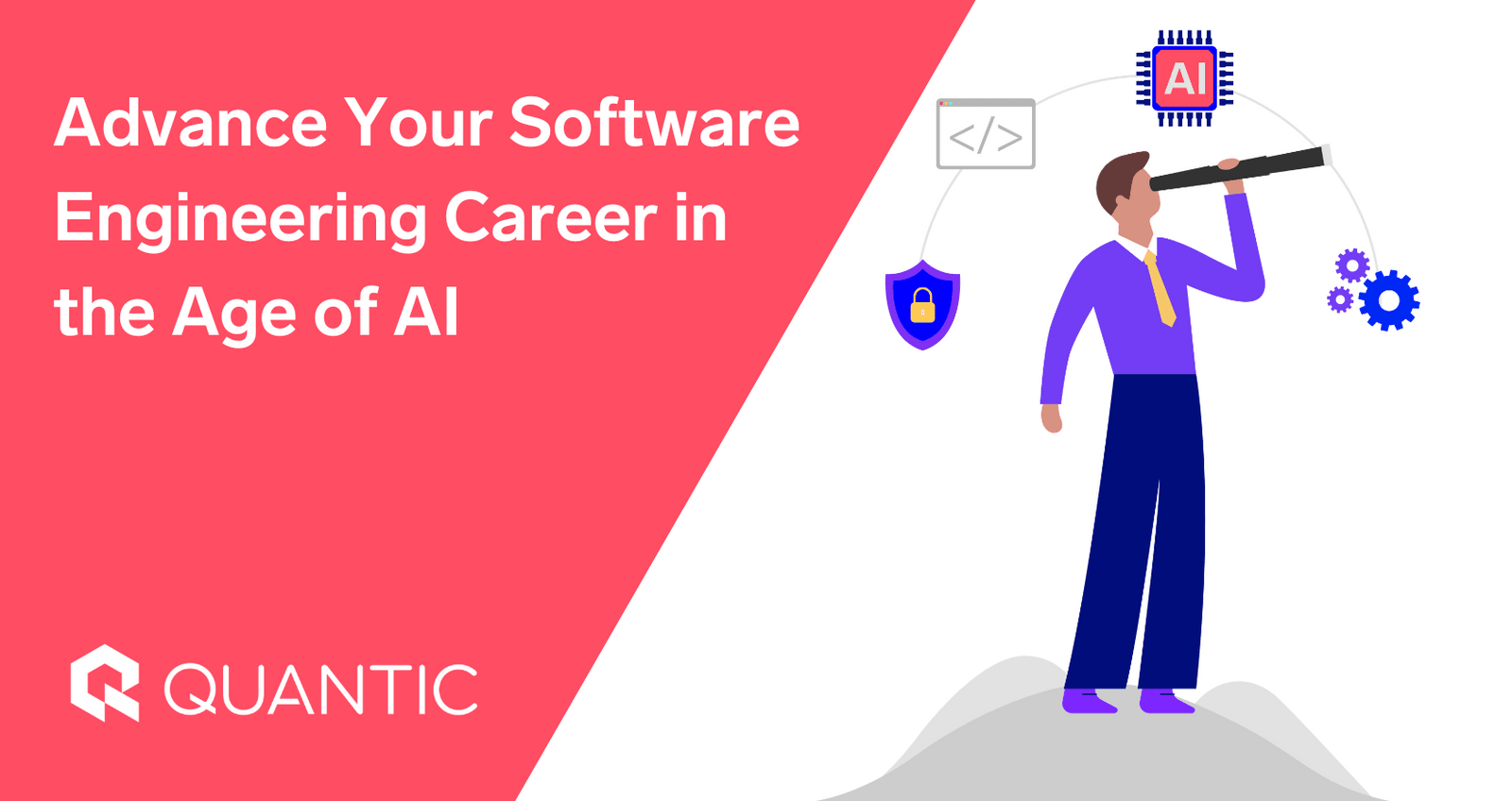ARTIFICIAL INTELLIGENCE
Software Engineering Careers: Thrive in the Age of AI
The global AI Development Tool Software market is rapidly expanding, with revenue reaching $8.44 billion in 2024 and growing at an annual rate (CAGR) of 8.61%, hitting $12.75 billion by 2029. As a result, this surge reflects the increasing adoption of AI technologies across industries, dramatically reshaping how software engineers design, deploy, and manage applications. In particular, from machine learning to natural language processing and computer vision, AI is fundamentally transforming the software engineering landscape.
However, this growth also presents challenges for professionals. Staying competitive requires mastering cutting-edge tools like AI model deployment platforms, AutoML solutions, and AI-integrated development environments while adapting to new workflows and methodologies. For many, the question is: how do you build the expertise to thrive in this AI-driven future?
This article explores the transformative role of AI in advancing software engineering careers and highlights how Quantic’s Master of Science in Software Engineering (MSSE) program empowers professionals with the tools, knowledge, and hands-on experience to lead in this rapidly changing industry.
What is AI-Driven Software Development?
AI-driven software development is all about integrating artificial intelligence into key stages of software creation—coding, testing, deployment, and maintenance. Think of it as giving developers a powerful assistant that automates repetitive tasks, improves decision-making, and boosts both the efficiency and quality of their work. Using technologies like machine learning, natural language processing, and predictive analytics, AI is transforming how software gets built and maintained.

How AI is Transforming Software Development
AI is revolutionizing traditional workflows by automating tasks and improving efficiency. Key transformations include:
- Smarter Code Analysis: AI-powered tools like DeepCode and TabNine act like a second pair of eyes, analyzing codebases, suggesting real-time fixes, and even auto-generating code snippets. This saves developers countless hours.
- Streamlined Deployment: Machine learning helps predict potential bottlenecks in delivery pipelines, ensuring smoother, faster software releases with fewer hiccups.
- Improved Testing and Debugging: AI frameworks simulate real-world user behavior to uncover tricky edge cases, ensuring software is robust and ready for action.
These innovations don’t just make the development process faster—they also make applications more reliable and resilient.
A Real-World Example
Consider continuous integration and deployment (CI/CD) pipelines: Microsoft uses AI tools like Azure Monitor and Application Insights to track performance, detect issues, and provide actionable recommendations in real time. This means faster release cycles, better system stability, and fewer production headaches.
10 Must-Have Skills for AI-Driven Software Engineering
AI is transforming software engineering, and staying ahead means mastering a mix of technical and leadership skills. Whether you’re building smarter systems or leading cross-functional teams, here are ten must-have skills for thriving in AI-driven software development:

1. AI-Driven Software Design and Architecture
- Why It Matters: Designing AI-ready systems is no small task. It requires creating architectures that can handle vast data flows, scale efficiently, and process tasks in real-time.
- Example: Think of developing a modular system that seamlessly integrates AI tools like fraud detection or recommendation engines into existing software—without disrupting its core functionality.
2. Machine Learning and AI Engineering for Real-World Applications
- Why It Matters: Building effective AI solutions isn’t just about creating models—it’s about deploying and optimizing them to solve real-world challenges.
- Example: Fine-tuning AI chatbots, like those powered by GPT, to provide accurate, context-aware responses that improve customer experiences.
3. Mastery of Cloud-Native Applications and Architectures
- Why It Matters: Cloud platforms such as AWS and Azure form the backbone of scalable AI applications. Engineers need to design cost-effective, cloud-native systems.
- Example: Deploying AI models on serverless platforms like AWS Lambda to handle demand spikes while minimizing costs.
4. Continuous Integration, Testing, and Deployment for AI Systems
- Why It Matters: AI systems evolve quickly, so seamless testing and deployment pipelines are critical to maintaining reliability and performance.
- Example: Automating the testing of machine learning models to ensure updates don’t compromise performance in production environments.
5. Blockchain Integration in Software Systems
- Why It Matters: Blockchain can enhance transparency and security in AI systems, especially when managing sensitive or distributed data.
- Example: Using blockchain to verify the authenticity of datasets used to train AI models, ensuring unbiased and reliable results.
6. Advanced Communication with Data and AI Outputs
- Why It Matters: AI engineers need to bridge the gap between technical outputs and actionable business insights.
- Example: Designing dashboards that translate AI analytics—like customer behavior patterns—into easy-to-understand visuals for stakeholders.
7. Leadership and Organizational Strategy for AI Projects
- Why It Matters: Successful AI projects require more than technical expertise—they thrive on effective collaboration and strategic alignment with business goals.
- Example: Leading a team to integrate a machine learning model into a customer support tool while ensuring it aligns with company priorities.
8. Statistical Foundations for AI and Software Engineering
- Why It Matters: At its core, AI relies on statistics. From feature selection to model evaluation, a solid understanding of statistical principles is essential.
- Example: Applying regression analysis to clean and prepare data, ensuring it’s ready for accurate AI model training.
9. Web Application and Interface Design for AI Integration
- Why It Matters: AI often interacts with users through web interfaces, so seamless integration with applications is critical.
- Example: Building a personalized e-commerce platform that uses AI to recommend products based on a user’s browsing history.
10. Agile Project Management for AI-Driven Development
- Why It Matters: AI projects are dynamic, requiring iterative development cycles to adapt to new insights and challenges. Agile methodologies are key to keeping teams productive and responsive.
- Example: Managing sprints with SCRUM to develop and refine an AI-powered predictive analytics tool.
Career Opportunities in AI-Focused Software Engineering
The rise of AI technologies has led to a surge in demand for skilled professionals in the field. For instance, job postings requiring AI expertise have skyrocketed, clearly underscoring this growing need. To illustrate this further, LinkedIn reports that AI specialist roles have achieved an impressive 74% annual growth rate over the past four years.
Moreover, this high demand has translated into lucrative salaries for AI professionals. Although salaries vary based on factors like role, experience, and location, the overall trend continues to rise. Specifically, according to Coursera, entry-level AI engineers can earn between $80,000 and $120,000 annually, whereas seasoned professionals often secure salaries exceeding $150,000.
As a result of these trends, it’s evident that the future holds significant opportunities for those equipped with AI skills. Here are some AI-focused engineering roles shaping the field:
- AI Software Engineer: AI Software Engineers design, develop, and deploy AI-based solutions to address complex problems, such as implementing recommendation systems, fraud detection algorithms, or predictive models.
- Job Market: The demand for AI Software Engineers has surged, with LinkedIn reporting a 74% annual growth in AI-focused roles.
- Salary Insights: The average salary for AI Software Engineers ranges from $125,000–$160,000, with top earners exceeding $200,000 annually.
- Machine Learning Developer: Machine Learning Developers specialize in building, training, and optimizing machine learning models while integrating them into software systems.
- Job Market: The global machine learning industry is projected to grow significantly, from $21.2 billion in 2024 to $209 billion by 2032, ensuring consistent job opportunities in this field.
- Salary Insights: Machine Learning Developers earn an average of $140,000 per year, with experienced professionals earning significantly more.
- Automation Engineer: Automation Engineers focus on integrating AI to automate workflows, enhance efficiency, and reduce operational costs across industries.
- Job Market: The growing adoption of robotic process automation (RPA) and AI-powered systems is driving demand for professionals in this role.
- Salary Insights: Automation Engineers earn $110,000–$130,000 annually, with opportunities in industries ranging from tech to manufacturing.
- AI Systems Architect: AI Systems Architects design scalable and efficient infrastructure for AI systems, aligning technical solutions with business goals.
- Job Market: As AI adoption accelerates, the demand for AI Systems Architects is expected to grow by 30% by 2028, according to industry forecasts.
- Salary Insights: Professionals in this role earn between $150,000–$180,000, with additional perks such as bonuses and equity.
- DevOps Engineer with AI Focus: DevOps Engineers with AI expertise ensure seamless deployment and maintenance of AI-powered applications, bridging the gap between development and operations.
- Job Market: The integration of AI into DevOps pipelines is creating a surge in demand for engineers with expertise in CI/CD for AI systems.
- Salary Insights: DevOps Engineers specializing in AI earn $120,000–$160,000, depending on experience and location.
Why Choose Quantic’s Master of Science in Software Engineering (MSSE) for Future-Ready Software Engineers
Quantic’s Master of Science in Software Engineering (MSSE) program is designed to equip professionals with the technical expertise, problem-solving skills, and leadership abilities needed to excel in the fast-evolving, AI-driven engineering landscape. The program blends cutting-edge curriculum, project-based learning, and global networking opportunities to help students not only adapt but thrive in the future of software engineering.
Active, Project-Based Learning
At the heart of the MSSE program is active, hands-on learning. Students work on projects and real-world applications that focus on AI software development and cutting-edge engineering techniques. This practical approach ensures that students develop both technical and project management expertise, setting them up for success in the industry.
Tailored Curriculum for Real-World Challenges
The MSSE curriculum is carefully designed to meet the demands of modern software engineering, emphasizing technical mastery, collaboration, and leadership. It includes:
- Core Concentrations:
- AI-Driven Software Development: Learn to integrate AI into the software development lifecycle, enhancing coding, testing, and deployment processes.
- Advanced Software Engineering Practices: Explore methodologies like SCRUM and Agile to improve team productivity and project outcomes.
- Specializations:
- Machine Learning and AI Engineering: Dive deep into building, deploying, and optimizing AI models for real-world applications.
- Cloud-Native Architectures: Gain expertise in leveraging cloud platforms like AWS and Azure to create scalable, efficient, and secure AI-driven systems.
- Capstone Project:
- Apply what you’ve learned in a team-based, collaborative project designed to solve a real-world software engineering challenge. This mirrors the professional environments students will encounter in their careers.
What Makes Quantic’s MSSE Program Unique?
AI-Driven, Mobile-First Learning Platform: Quantic’s award-winning, interactive platform allows students to learn anytime, anywhere, with the flexibility to balance their studies alongside professional and personal commitments. The AI-powered platform personalizes the learning experience, ensuring it adapts to each student’s needs and pace.
Global Peer Learning and Networking Opportunities: Students connect and collaborate with a global cohort of peers, industry mentors, and faculty. The program includes virtual academic events, optional in-person meetups in cities around the world, and access to student-led organizations, providing unparalleled opportunities for professional growth and networking.
Accessible and Affordable: At just $950 per month for the 13-month program, Quantic’s MSSE offers exceptional value. Students often take advantage of employer reimbursements, tuition benefits, and scholarships to reduce costs further, making the program accessible to a wide range of professionals.
The future of software engineering is being shaped by advanced technologies like AI, machine learning, and cloud computing. To stay ahead, professionals need more than just technical skills—they need the ability to lead, innovate, and solve complex challenges.
Quantic’s MSSE program provides the perfect blend of technical expertise, hands-on learning, and global networking opportunities to prepare professionals for the future of software engineering. Whether you’re looking to advance your career, lead transformative projects, or excel in an AI-driven world, Quantic’s MSSE program offers the tools and connections to help you succeed.
Ready to take the next step? Explore Quantic’s MSSE program today and prepare to lead the future of software engineering.
Discover why our students love us and why we’re trusted by top employers around the world by reading Quantic reviews here.
Related articles:



